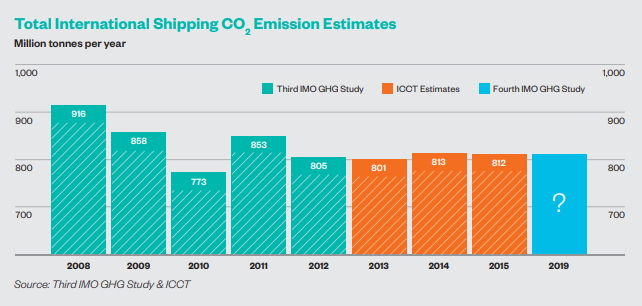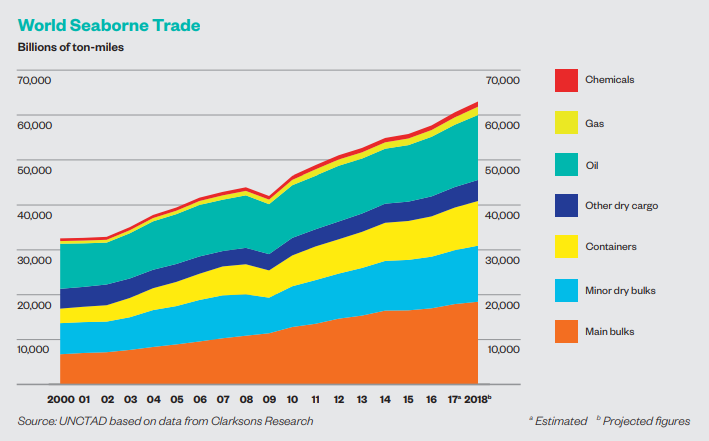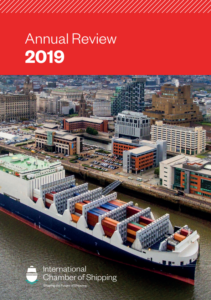ICS published its Annual Review setting out a broad cross section of just some of the many issues in which it is engaging on behalf of the global shipping industry. ICS said that its immediate focus, and of the shipowners it represents, is the successful implementation of the UN International Maritime Organization (IMO) global sulphur cap.
As Esben Poulsson, ICS Chairman noted, the Fourth Industrial Revolution, as envisaged by the World Economic Forum, will be fundamentally different from the previous three, as its underlying basis lies in radical advances in communication and internet connectivity. This will enable shipping industry to drastically improve the efficiency of maritime transport while supporting further improvements to safety and environmental performance.
However, the main focus of ICS is the successful implementation of the 2020 sulphur cap, which will take complete effect on 1 January 2020. Speaking on this matter, Mr. Poulsson said that:
I am proud of the comprehensive advice that ICS has produced to help shipowners prepare, and the notable success that ICS has had in persuading IMO to adopt appropriate guidelines for its Member States
[smlsubform prepend=”GET THE SAFETY4SEA IN YOUR INBOX!” showname=false emailtxt=”” emailholder=”Enter your email address” showsubmit=true submittxt=”Submit” jsthanks=false thankyou=”Thank you for subscribing to our mailing list”]
He added that these initiatives should go at least some way towards reducing the risk that shipowners ‘could be unfairly penalised by Port State Control authorities in the event that safe and compliant low sulphur fuels are initially unavailable in every port worldwide.’ Nevertheless, there are still many questions that will not be fully addressed prior to 2020, including what the cost of compliant fuels will be.
Namely, ICS stated that it is aware of the need for all economic activities, including international shipping, to cut GHG emissions as soon as possible, by using a combination of short and longer term measures. The fact is that the industry has already made significant CO2 reductions since 2008, something for which it is given insufficient credit. Nonetheless, ICS urged that the sector needs to redouble its efforts to deliver further dramatic improvements in fuel efficiency.

Regarding the transition to zero CO2 emitting fuels, a situation that ICS has called the ‘Fourth Propulsion Revolution’, Mr. Poulsson said that it requires truly massive investment in research and development, which ICS believes must be at the heart of the IMO GHG Strategy ‘if the ambitious reduction targets that IMO Member States have set are to be met.’
In addition, ICS has made a comprehensive review of the IMO STCW Convention governing seafarers’ training standards and has also recorded progress on various other important legal and policy issues at many different international fora. This includes the International Labour Organization, in Geneva, with which ICS is celebrating 100 years of co-operation, and the United Nations, in New York, where Mr. Poulsson joined the first round of high level negotiations on a new UN Law of the Sea agreement for the protection of marine Biodiversity in Areas Beyond National Jurisdiction (BBNJ). This aims to lead to significant consequences for the future regulation of shipping.
Moreover, ICS is worried about many pressing issues, such as the danger of a global trade war. There is also an important increase in the number of violent pirate attacks off West Africa, while the thousands of migrants continue to drown in the Mediterranean. As far as the latter is concerned, ICS said that there are more and more questions as to whether ships participating in large scale rescue operations can be confident that prompt and predictable disembarkation of rescued people will continue.

Furthermore, ICS aspires to ensure that the shipping industry can form a united front to influence its global regulators, especially at IMO, in order for regulatory outcomes agreed by governments to be compatible with economic sustainability, and also ensure continuous improvement of safety and environmental protection.
Finally, in April 2019, ICS signed an MoU with ASA and ECSA to further enhance their good cooperation as representatives of the world’s national shipowner associations.
You may see more information in the PDF herebelow































































